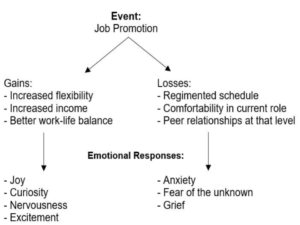
What comes to mind when you hear the word “grief”?
For most people, the word “grief” likely elicits a number of thoughts and feelings, and it is often associated with the loss of a life.
Death seems to be the most common association with grief (understandably so) but there are many other facets of grief that often go unnoticed!
There is the grief associated with other losses, such as the loss of hopes, dreams, friendships. And then there is the loss associated with positive things, such as the loss involved when we set healthy boundaries, release an unhealthy coping mechanism, change careers, or move to a new city. This is what I call the grief in the good.
It seems paradoxical to experience grief when so many things are going well in one’s life. It is quite common for someone to actually feel a mixture of positive and negative emotions when experiencing something good happening to them. So, you may wonder how that may be which we will discuss this paradox of duality shortly, but first let’s look at an example of what it means to become aware of the grief in the good.
Below is a chart depicting the hypothetical event (ie- a job promotion) and the dual experiences involved categorized as “losses” and “gains.”
Note how the emotional responses induced by the “gains” often occur simultaneously with the emotional responses to the “losses.”

In this example, we can see the paradox that flexibility is gained (ultimately, this is something that one may value), but it comes with the loss of a regimented schedule that perhaps afforded a different type of stability and comfortability. Although this person may get to be more flexible in the work setting, that comes with increased responsibility and therefore a loss of perhaps some level of immaturity or unaccountability.
Oftentimes when something good happens in life, we skip to the “expected” feelings. We receive praise and begin to think of all of the amazing opportunities granted to us.
Have you ever noticed that if you try to acknowledge the negative feelings associated with the positive event, we get criticized by people around us, or get called “negative” or “pessimistic”?
It is not pessimistic to validate your feelings of grief and loss, even when the activating event is ultimately a positive one.
Acknowledging and validating your feelings actually evidences self-awareness and allows you to help meet your own needs and decreases the need for validation from others.
The example provided is simple to understand, but this doesn’t mean it is easy to incorporate this awareness into your life. People often avoid grief because it can be a dark place, especially when it is there in which we face many unknowns.
So how can we honor the grief without fear? I’m here to help you do just that.

Below are 4 tips to help you process the grief in the good without fear:
- Understand the value of becoming aware of your grief: Life is filled with duality– light and dark, truth and lies, joy and sorrow– and we cannot have one without the other. Ponder this for a moment: How could we know what “light” looks and feels like if we did not have the opposite to which to compare? And don’t the times of joy mean that much more when we are coming out of a place of depression or sadness? The value of grief awareness is that we can honor the duality of reality.
- Understand the value of attending to your grief: Attending can be equated to being present. Increasing self-awareness of our emotions, particularly grief, allows the opportunity to validate our own feelings. While it can be helpful to have trusted others in our lives to help validate how we feel (for example, your therapist at Solid Foundations), there seems to be a very personal place in people’s hearts where only they can reach. It is a part of themselves that resonates intimately and deeply with the power of self-validation. Plus, if we frequently ignore, and therein invalidate, our own feelings and remain emotionally unavailable to ourselves, it makes it much more difficult—and perhaps highly unlikely—that we can be truly emotionally intimate with others. The relationship of self is arguably one of the most foundational for the development of relationships with others.
- Identify how you are feeling: As with the example explored earlier, when good things are happening, like a job promotion, grief is unlikely to be the predominant feeling. Just as it is important to honor grief, it is important to honor the other very real emotions as well. You can practice identifying and labeling your feelings through mindfulness and routine check-ins with yourself in order to increase your emotional awareness. This will help you to acknowledge whether grief and loss are a part of your experience. Tools like a feeling wheel or feeling chart can be found on Google and can be a great starting place to learn clear and adoptable language to label your feelings.
- Find tangible ways to honor the grief: When we are celebrating something good, like that job promotion, we see many actions involved. Using the example, we may make phone calls to loved ones to share the news of the promotion, sign work contracts for the new role, or share the news via social media. With grief resonating from a more sensitive place, it is something that will be experienced in a different way. We can make this experience more concrete and tangible, though, by taking actions to honor grief. Perhaps you write a letter to the coworkers you are leaving (and you can choose to send it or not), commemorate your work with a dinner with peers prior to the promotion, or develop some type of self-care ritual during your final days at the office.
If you are struggling with grieving something good that has happened in your life, you do not have to go through the experience alone. In fact, it is valuable to have a trusted person to join in your journey whether you are celebrating the good or acknowledging your grief. I encourage you to take time to be with yourself and to have the courage to open up to a trusted individual, and especially your therapist, about the possibility and paradox of acknowledging your grief in the good.
If you are struggling to process the grief you are feeling, Solid Foundations Therapy is here to help. Visit our website at www.solidfoundationstherapy.com or give us a call at 630-633-8532 today!

